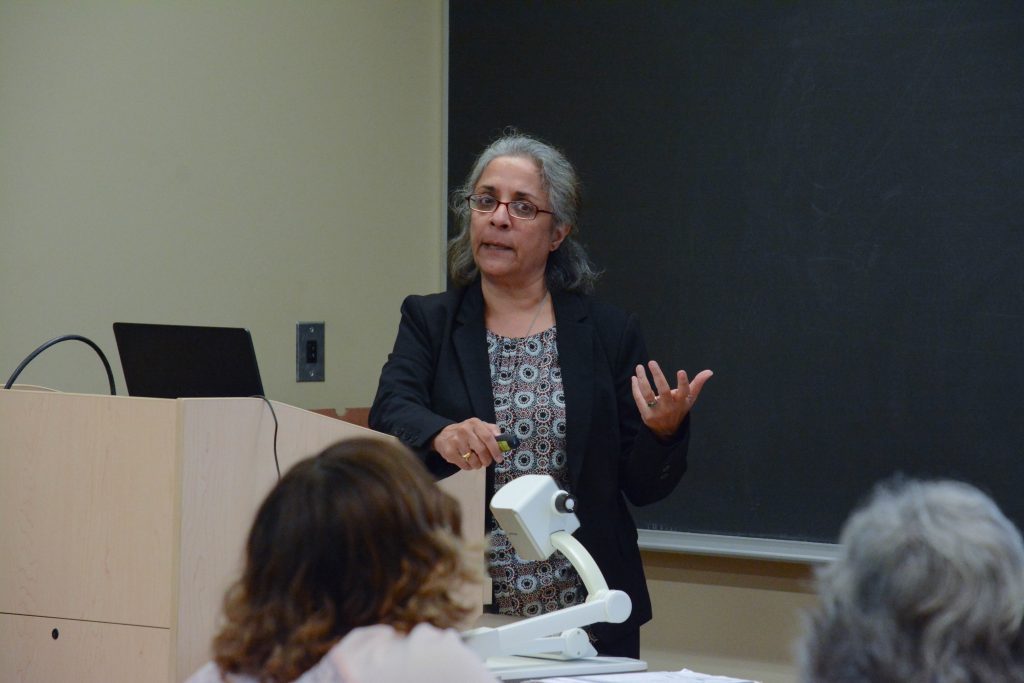
As the topic of immigration moves to the forefront of national consciousness, Sharmistha Bagchi-Sen emphasized the vital role immigrants continue to play in helping cities around the United States thrive.
This was the message Bagchi-Sen, a professor of geography at the University at Buffalo, brought to Binghamton University’s first geography department colloquium of the semester on Wednesday afternoon.
According to Bagchi-Sen, populations of cities around the country are on the decline because of increased relocation to the suburbs and metropolitan areas. Immigrants help fill the vacancies in these areas experiencing urban shrinkage.
“People are going to do the work for economic revitalization,” Bagchi-Sen said. “So we need to know who these people are, what makes them tick and how do we make them stay in the city to pursue economic revitalization.”
Bagchi-Sen has spent the last few years exploring how immigrant migration affects various urban populations in the United States. On Wednesday, she discussed the history and implications of shrinking urban populations.
Her lecture, “An Analysis of Demographic Factors in Declining Cities: The Role of Immigrants,” drew from the book “Shrinking Cities: Understanding Urban Decline in the United States,” which Bagchi-Sen co-authored with Russell Weaver, assistant professor of geography at Texas State University; Jason Knight, assistant professor of geography at Buffalo; and Amy Frazier, assistant professor of geography at Oklahoma State University.
“Very little focuses on the people,” Bagchi-Sen said. “We always say, ‘We have to have entrepreneurs, we have to do this.’ I’m looking at who are these immigrants and where do they come from, and how are they interacting with each other?”
She has spent the last few years working with Rachel Franklin, associate professor of population studies at Brown University, to identify patterns of immigration based on race and ethnicity.
According to Bagchi-Sen, while some cities across the United States are experiencing overall population decline, incoming immigrant populations are offsetting the effects of that loss.
She added that some of the key questions to be asked are who the foreign-born populations are, and what they are doing to help shrinking cities. Bagchi-Sen also noted that immigrant populations have started moving to smaller cities including Buffalo, Detroit and Indianapolis rather than major metropolitan areas.
According to Bagchi-Sen, combating population decline in U.S. cities starts with an understanding of the opportunities available in smaller cities. She suggested that students interested in jobs in major metropolitan areas should first consider options in smaller cities.
“It starts with an understanding,” Bagchi-Sen said. “Having that kind of opening up — a mental image, a mental map of relocation, job search — having a wider broader mental map.”
Most of the students in attendance were graduate students working on geography degrees, many of whom said they plan to pursue study on the topics mentioned in Bagchi-Sen’s presentation.
For Daniella Madubuike, a second-year graduate student studying geography, the colloquium gave her the opportunity to develop some of the ideas for her graduate thesis on the topic of declining cities.
“Later along this year, I will be reviewing other shrinking cities, other master plans, so looking at this from [Bagchi-Sen’s] perspective gave me an idea of how I can look at this, but also how I can put my own perspective on [the topic],” Madubuike said.
The department chose to introduce a theme to the colloquium series for the first time this year: technology and sustainability. According to Norah Henry, an associate professor of geography at BU who organizes the colloquium series, the theme was selected due to its widespread popularity in geography coursework and its relevance to today’s students.
Future lectures will focus on drone use, spatial viewing through Google Earth and political sustainability through gerrymandering.


